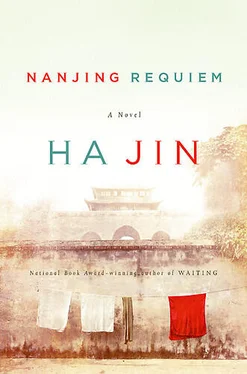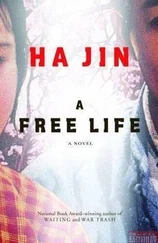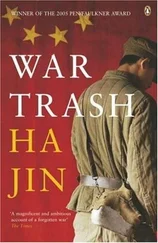That brought out laughter among the foreigners, while most Chinese remained quiet, bewildered. Indeed, a funeral was a sorrowful, solemn occasion. How come these foreigners wisecracked and gave belly laughs?
After the reminiscences, Searle, his face freshly shaved and his hair combed back, went to the pulpit and delivered a sermon in honor of Monica titled “The Christian Duties in the Time of War.” He spoke in Mandarin about the Japanese annexation of some Asian countries and about their brutalities. I knew that the Japanese kept a watchful eye on him because of his writings about their exploiting the narcotics business, and that they had also demanded that he surrender all the paperwork of the International Relief Committee — including the records of nine hundred cases of murder, rape, and arson within the Safety Zone perpetrated by Japanese soldiers during the first weeks after the fall of Nanjing — but he had told them that Eduard Sperling had taken all the files back to Cologne. Searle talked about the situation in Europe. He said, “Under the threat of a world war, what should we Christians do? First, we must strive to make peace and oppose war. Some of you were here when Nanjing fell two years ago and saw with your own eyes what it was like. Men can be more vicious than beasts of prey if they’re put in the extreme situation of war. No rules will be followed, and all kinds of evil will be unleashed. War is simply the most destructive force we human beings can produce, so we must make every effort to prevent it.
“However, if we survey human history, we can see that there were times when war was unavoidable, even necessary. There have been some wars that can be called just wars. For example, if people take up arms against foreign invaders, can we blame them? Should we attempt to dissuade them from fighting their national enemy? Of course not. Therefore, the Christians in those countries should fight like common citizens and should combine their fulfillment of Christian duties with the survival of their nations. As for those Christians whose countries are aggressors, they should do the opposite — work against war and do their utmost to make peace.”
After hearing Searle’s words, I was sure that the Japanese wouldn’t leave him alone from now on, but he must have become accustomed to dealing with them.
Searle concluded, “As for those Christians in countries that are not involved in war, like the Americans among you, we must align ourselves only with the weak and the victims, just as our late Sister Monica did for the orphans in Nanjing. This is the only moral stand we should take. The true Christian position should be standing between humanity and the unregarding force.”
The audience liked his sermon, especially the Chinese. The instant Searle had finished, a few people clapped their hands, then stopped short, realizing this wasn’t an occasion for applause.
Reverend Wei gave a closing prayer, imploring God to receive Monica’s soul and to grant her eternal joy. Then everyone stood and sang “O God of Love, O King of Peace.”
After the funeral, Minnie said she hoped that when she died, she could have a similar service, full of warmth and dignity, like the one we had just attended to celebrate the ascent of Monica’s soul. The dead woman must be at peace now.
MISS LOU CAME to the main office the next morning, because some families in the neighborhood had run out of food and their children were starving. I stepped out of the inner room and joined the little woman. Seated in her chair with the unfinished paperwork for student scholarships on her desk, Minnie yawned. “Excuse me,” she said, covering her mouth with her palm. “I get tired so easily these days that I often drop off. And my eyes throb with double vision.” Lately she often joked that she looked sixty and felt eighty.
“You’ve worked too hard,” Miss Lou said. “You need a long vacation.”
“Yes, you owe yourself one,” I agreed.
“I’m supposed to be on furlough in the summer, but it’s unlikely I can do that,” Minnie said. “I’ll have to stay around to take care of things here. Now, Miss Lou, what should we do for your neighbors without food? We must make sure they will at least have a decent meal on the Spring Festival’s Eve.”
“That’s why I came to see you. I’m also wondering if your college has an extra quilt. A poor woman lost her only quilt yesterday afternoon, stolen by a thief who broke into her home. Her husband disappeared and she’s too ill to scratch out a living. Actually, she sewed all her savings, ten yuan in total, into her quilt, so the money is gone too.”
Minnie turned to me. “Do we have enough rice to spare some?”
“Sure,” I answered. The previous fall I’d bought eleven wagon-loads of rice at twenty-five yuan per picul (133.33 pounds), a smart move at two-thirds of the current price, so we could offer some to the destitute. “But we might have given away all the quilts we made last fall,” I said. “I’ll have to check.”
We went to the main dormitory and found no extra quilts. So Minnie turned into her own apartment in the same building and grabbed the one from her bed. “Take this,” she said to Miss Lou.
“You have another quilt for yourself?” the little woman asked.
“I have a duvet and a warm blanket.”
Miss Lou left happy, having said she would come with a wheelbarrow to pick up the rice the next day.
IN MID-MARCH Yoguchi informed us that Mr. Tanaka couldn’t get the travel permits for the three of us anymore, because the officer in charge of travel papers, Tanaka’s fellow townsman, had left Nanjing. Also, citizens here, especially the Christians, were discouraged from visiting Japan. The cancellation of the trip disappointed me and aggravated my temper, and my antagonism toward Shanna and Rulian flared up again. If they got on my nerves, I didn’t hesitate to give them a piece of my mind to let off some steam. I knew they would bad-mouth me behind my back, but I didn’t care. Minnie said I sometimes deliberately picked fights with them. That might be true, but she couldn’t see the main cause: there was this anger seething in me because the canceled trip had dashed my hopes of going to Japan.
Rulian was tolerable on the whole, but I found Shanna insufferable. She was from a well-to-do family and had the extravagant habit of dining out every weekend. She often boasted about the dishes she ordered in restaurants downtown. One day at recess, I overheard her speaking about the Osaka Terrace to a bunch of women in the Homecraft School. “Believe it or not,” she said, “I wanted to puke when I tried sushi for the first time. It tasted like a dead slug in my mouth, especially the tuna. But my friend urged me to go on, and by and by I began to like it. Now I can taste different kinds of sushi. I like the eel most.”
“My goodness, even if they paid me I wouldn’t eat raw fish,” a short woman said.
“It’s actually more nutritious,” replied Shanna.
“That’s wild,” said a spindly woman.
“You don’t believe me?”
The bell rang, and the women started back for the classrooms. After they were gone, I said to Shanna, “You shouldn’t have talked about fancy Japanese food in front of them.”
She pulled a long face. “They asked me about it.”
“But you’re not supposed to be a salesgirl for Japanese restaurants.” My gorge was rising as I spoke.
“You know what? That place is owned by two Chinese men who’re brothers.” Her nose, the shape of a big clove of garlic, quivered, but she avoided looking me in the face.
“Still, you went too far. Lots of people in Nanjing are starving, while you brag about raw seafood.”
“It’s none of your business.”
Читать дальше











